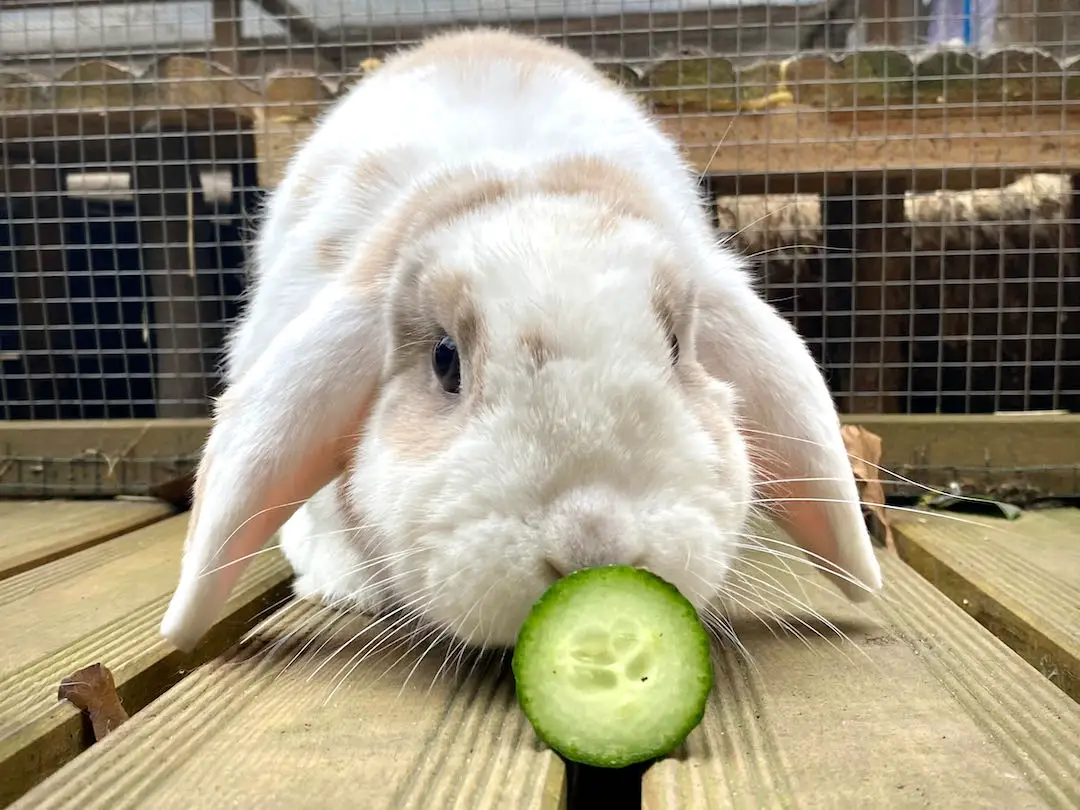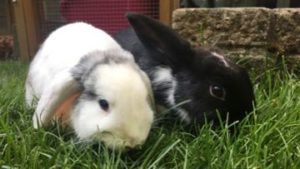Especially in summer, we get through a lot of cucumber. It ends up in salads, additional toppings for sandwiches, and, cut into batons, eaten with plenty of hummus.
But can our bunnies also eat cucumber safely? What about the seeds? Or the skin?
So I spent some time researching, to make sure you had some solid, dependable information. Here’s a summary, and then you can read on for more detailed information.
Can rabbits eat cucumber safely?
Rabbits can eat cucumber safely, including the seeds and the skin. You can feed cucumber to bunnies in small, treat size portions. Cucumber contains some potassium and vitamin A which rabbits need. Cucumber is a good treat for obese rabbits, as it is low in calories. Cucumber is also a good treat for the summer, as the high water levels make it a refreshing, hydrating snack for bunnies.
Nutritional value of cucumber for rabbits
Here’s a look at the vitamins, minerals and other nutrients that cucumbers have, and how important each is for rabbits.
| Ingredient | Nutritional value per 100g | Importance of nutritional value for rabbits |
|---|---|---|
| Water | 95.2g | Cucumbers are mostly water – so can be good on hot summer days for bunnies. |
| Energy | 15 kcal | This is low. Cucumber as a treat isn’t going to make your rabbit too fat (unlike some other treats which are high in sugars or carbohydrates) |
| Fibre | 0.5 g | Rabbits need a lot of fibre, and cucumbers don’t provide much (even with the skin) so cucumbers can’t be the main food for a rabbit. Bunnies need plenty of hay as their main diet. |
| Carbohydrates | 3.63g | Cucumbers are pretty low in carbohydrates – so nothing to worry about here. |
| Iron | 0.28mg | Rabbits need at least 3mg of iron per 100g of feed for their daily needs, so cucumber provides a little of the iron they need. |
| Magnesium | 13mg | Rabbits need at least 30mg of magnesium per 100g feed daily, so cucumber provides some of the magnesium bunnies need. |
| Potassium | 147mg | Rabbits need about 600mg of potassium per 100g feed each day. Cucumber can provide some of their potassium requirements. |
| Vitamin C | 2.8mg | Rabbits don’t need vitamin C – their bodies can make it themselves. |
| Vitamin A | 105 IU | Rabbits need about 1,000-1,200 IU daily per 100g feed of vitamin A, so cucumber helps a bit towards meeting this need. |
| Other nutrients | Not present in large enough quantities to be significant for bunny nutrition |
As you can see from the table, cucumbers aren’t going to make a massive difference to your bunny’s nutritional needs, though they will help provide some of the requirements, particularly for potassium and vitamin A, but also a little iron and magnesium.
However, cucumbers are low in fibre, which is essential as a main component of a rabbit’s diet. Rabbits rely on fibre to keep their intestines healthy. Without fibre, they can get GI stasis (a type of painful constipation). This condition is dangerous for rabbits.
What this means is that cucumber can only ever be a small part of a rabbit’s diet – cucumber might be a suitable treat, but the main food for a rabbit should always be hay and water.
Is cucumber safe for rabbits to eat?
Cucumber is safe for rabbits to eat, so long as you only feed them small portions. Cucumber is not toxic to rabbits, containing nothing that might poison them. The main danger with cucumber is if your bunny eats too much, as that could lead to stomach problems.
The problems come in two areas. First, cucumber is high in water, so if it is the main food a rabbit eats, their intestines become too runny – the rabbit can get diarrhoea. In turn, this means that the rabbit can’t easily eat their caecotropes, which they rely on to make vitamin B and other nutrients.
Secondly, the lack of fibre can lead to food not moving through the intestines properly, potentially causing gastro-intestinal stasis (GI stasis).
If your rabbit develops diarrhoea, or stops pooping, consult a vet straight away.
Can rabbits eat cucumber seeds and skin?
Rabbits can safely eat cucumber seeds – there’s no need to scoop out the inside of the cucumber. And rabbits can also eat cucumber skin, so you don’t have to peel cucumber before giving it to bunnies. The skin will provide fibre, and rabbits need a lot of fibre. In fact, the skin is the most nutritious part of the cucumber for rabbits.
If you have cucumber plants, then the leaves are also safe to feed to your rabbits.
How much cucumber can rabbits eat?
You should give a mature rabbit a portion size of cucumber no bigger than 1 tablespoon for every 2lb (1kg) of bodyweight. So a 6lb rabbit could have up to 3 tablespoons of cucumber. This is about 50g or 2oz of cucumber. In other words, you can give your rabbit a few slices of cucumber.
You don’t want to give more than this, because the bunny will start to fill up with a food which is too low in fibre and protein, and too high in water.
What happens if rabbits eat too much cucumber?
Feeding rabbits too much cucumber could lead to problems with the delicate digestive system of rabbits. Having too much liquid could lead to diarrhoea – which in turn can lead to other problems. For example, rabbits produce caecotropes (a special type of poo that they then eat to get more nutrients out of food). If their stools are too runny, they can no longer do this. If your bunny starts getting diarrhoea, consult a vet as soon as possible.
Can baby rabbits eat cucumber?
Don’t give cucumber to baby rabbits. As rabbits begin to mature a little, the best advice is to introduce one new food at a time, in small portions, slowly. This way, you can give their digestive systems time to adjust to new foods and make sure that the bunnies aren’t struggling with too rich a diet for their development stage.
Do rabbits like cucumber?
Some rabbits like cucumber; others don’t. Just like humans, rabbits can have different tastes and preferences from each other. We have tried giving our rabbits a slice or two of cucumber, and they rather sniffily rejected it. A bit like having toddlers, really…
There’s only one way to find out for your rabbit. Try giving them a slice. Your bunny will let you know whether or not they are a fan of cucumber.
How does cucumber fit into the overall rabbit diet?
The main food for rabbits should always be hay – for example, Timothy hay. Hay provides the right balance of protein, fibre and minerals for bunnies, and also keeps their teeth healthy (read more about rabbit teeth here) – and dental problems cause big issues for rabbits. Rabbits also need access to lots of fresh drinking water.
Besides these two essentials, rabbits also benefit from having some greens each day – about a handful (think spinach, spring greens, parsley, coriander (cilantro)). Cucumber leaves can be included here. These greens make sure that the rabbit is fed the full range of the vitamins and minerals they need (you can find out more about rabbits’ nutritional needs here).
Rabbits can also have some vegetables, such as carrot and broccoli, up to about a tablespoon per 2lb/1kg body weight. Cucumber counts in this type of food.
Beyond that, rabbits can also have treats, such as smaller portions (a teaspoon per 2lg/1kg bodyweight) of fruits, which are high in natural sugars.
And many owners also give their rabbits about an eggcup-full of rabbit nuggets (also called pellets) each day.
Conclusion
Cucumbers are safe to feed to rabbits as snacks as part of a healthy diet based mainly on hay and fresh water. Cucumbers will provide a little of the minerals and vitamins that bunnies need for a healthy life.
If you’re interested in what rabbits can eat, check out our guides on what fruit you can feed rabbits, and what herbs are safe for rabbits.
We also have a thorough post on the vitamins and minerals that rabbits need, and how rabbits digest their food.
Want to keep your bunny entertained? Take a look at the toys that our bunnies loved.


